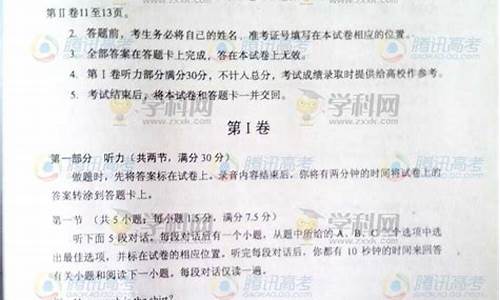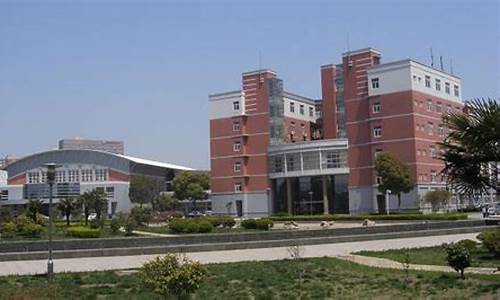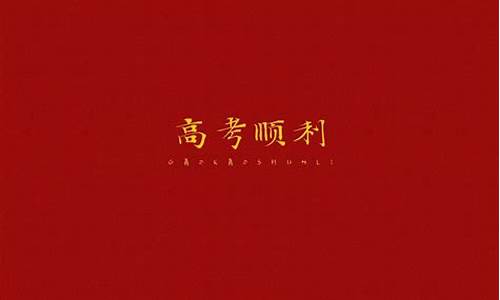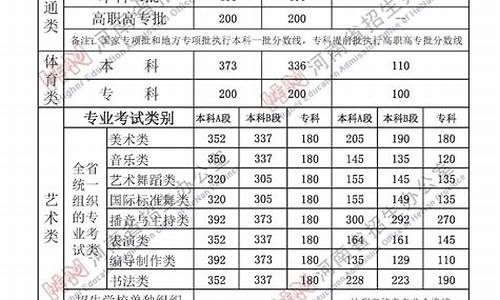您现在的位置是: 首页 > 教育改革 教育改革
2014高考真题虚拟语气,2014高考真题虚拟语气答案
tamoadmin 2024-07-27 人已围观
简介1.高考英语之虚拟语气归纳整理的介绍2.虚拟语气高考考点3.虚拟语气用法总结4.强调句型总结5.高考英语之虚拟语气归纳整理的第一类典型高考英语陷阱题详解·虚拟语气 2008-09-14 07:46 P.M. 1. I forget where I read the article, or I _________ it to you now.A. will show B.
1.高考英语之虚拟语气归纳整理的介绍
2.虚拟语气高考考点
3.虚拟语气用法总结
4.强调句型总结
5.高考英语之虚拟语气归纳整理的第一类

典型高考英语陷阱题详解·虚拟语气 2008-09-14 07:46 P.M. 1. I forget where I read the article, or I _________ it to you now.A. will show B. would show C. am going to show D. am showing陷阱几个干扰项均有可能误选。分析正确答案选B。根据上文的语境可知句中的 or 隐含有一个虚拟的条件,即 or=if I didn’t forget where I read the article(要是我没忘记我在哪儿读过这篇文章的话——但事实上忘了)。2. “It looks as if he were drunk.” “So it does. _________.”
A. He’d better give up drinking B. He shouldn’t he drunk so much C. Health is more important than drink D. I wonder why he is always doing so陷阱几个干扰项均有可能误选,主要是受句中 drunk 一词的影响。分析最佳答案为D。关键信息是It looks as if he were drunk 中的虚拟语气,句子既然用了虚拟语气,也就是说,“他喝醉了”不是事实,只是他的言行好像是醉了,所以此题的最佳答案是D。3. “Mary looks hot and dry” “So _________ you if you had so high a fever.”A. do B. are C. will D. would陷阱容易误选A或C。选A者,认为前后两句的动词性质应一致;选C者,认为其后带有if 条件状语从句,从语气上看,主句应用将来时态。分析此题最佳答案为D。分析如下:(1) “so + 助动词 + 主语”是一个很有用的结构,它表示“……也一样”时。如:He likes to watch TV, and so do I. 他喜欢看电视,我也一样。When animals and plants disear, so will man. 当动植物消失的时候,人类也会随之消失。(2) 由于空格后的 if 条件状语从句的谓语用的是虚拟语气(这是很重要的信息),所以主句要用 would 而不用 will,即答案应选D。4. “He will come tomorrow.” “But I’d rather he _________ the day after tomorrow. A. will come B. is coming C. came D. had come陷阱容易误选A或B。根He will come tomorrow 以及下文的时间状语 the day after tomorrow 似乎都表明空白处应填一个一般将来时态。分析但此题的最佳答案是 C。按照英语习惯,would rather 后接that 从句时,从句谓语通常要用虚拟语气,即用过去式表示现在或将来,用过去完成时表示过去。又如:that I’d rather you left right now. 我宁愿你现在就离开。I would much rather it was forgotten. 我更愿这事被遗忘掉。I’d rather he hadn’t told me about it. 我宁愿他没告诉我这事。5. All the doctors in the hospital insisted that he _________ badly wounded and that he _________ at once.
A. should be; be operated on B. were; must be operated onC. was; should be operated D. was; be operated on陷阱几个干扰项均有可能误选。分析最佳答案选 D。insist后的从句谓语有时用“should+动词原形”这样的虚拟语气,有时不用,具体要看该谓语动词所表示的含义。一般说来,若该谓语动词所表示的动作尚未发生,或尚未成为事实,则用虚拟语气;若该谓语动词所表示的动作已经发生,或已经成为事实,则要用陈述语气。分析上题的句意,可知只有选D最合适。6. _________ smoking, he would not he got cancer in the lung.
A. Was he given up B. Had he given upC. Did he give D. If he ge up陷阱容易误选 D。分析正确答案应选B。之所以不能选D,是因为时态前后有矛盾。由于主句谓语是would not he got,这表明是对过去事实作出的设,所以从句谓语应该是 had given up,而不是像D项那样用一般过去时。另外,当虚拟条件句中有 had, should, were 等词时,通常可以省略 if,并将 had, should, were 提前置于句首。又如:Were they to cease advertising, prices would come down.= If they were to cease advertising, prices would come down. 如果他们停止做广告,价钱会降下来。Had I been there, I would he filmed the occasion.= If I had been there, I would he filmed the occasion. 如果我在那里,我会把那场面拍摄下来了。
高考英语之虚拟语气归纳整理的介绍
使用虚拟条件句时要注意的几点:
1.当条件状语从句表示的行为和主句表示的行为所发生的时间不一致时,被称为“错综时间条件句”,动词的形式要根据它所表示的时间作出相应的调整。如:
If you had followed my advice just now, you would be better now.
If you had studied hard before, you would be a college student now, and you would graduate from a college in four years’ time.
2.if 省略句
在条件句中可省略if, 把were, had, should提到句首 , 变为倒装句式。如:
If I were at school again, I would study harder.
→ Were I at school again, I would study harder.
If you had come earlier, you would catch the bus.
→ Had you come earlier, you would catch the bus.
If it should rain tomorrow, we would not go climbing.
→ Should it rain tomorrow, we would not go climbing.
注意:若省略的条件句中的谓语动词是否定形式时,不能用动词的缩略形式。如:我们可以说:Were it not for the expense, I would go abroad now. 但不能说:Weren't it for the expense, I would go abroad now.
3.用介词短语代替条件状语从句。常用的介词有with, without, but for。如:
What would you do with a million dollars? ( = if you had a million dollars)
We couldn't he finished the work ahead of time without your help. ( = if we hadn't got your help)
But for the rain ( = If it hadn't been for the rain ), we would he finished the work.
4.含蓄条件句
有时为了表达的需要,在虚拟语气中并不总是出现if引导的条件句,而通过其他手段来代替条件句。
I was ill that day. Otherwise, I would he taken part in the sports meet. (副词)
He telephoned to inform me of your birthday, or I would he known nothing about it. (连词)
A man who stopped drinking water would be dead in about seven days. (定语从句)
I might he given you more help, but I was too busy. (连词)
Everything taken into consideration, they would he raiser their output quickly. (独立主格结构)
混合型与含蓄型虚拟语气
1。混合型虚拟语气:
当虚拟条件从句与结果主语所表达的时间不一致时,被称为“混合条件句”,这种虚拟语气被称为“混合型虚拟语气”,动词的形式要根据它所表达的时间作相应调整。如:
If you had followedthe doctor's advice ,he would be all right now.(条件从句表达的时间是过去,因此用had+过去分词;主句表示的时间是现在,因此用would+动词原形)
2.含蓄型虚拟语气:
有时候,虚拟条件不是通过if引导的条件句来表示,而是暗含在上下文中
(1).用but for 、without(如果没有)等来代替条件从句,如
Without electricity human life would be quite different=If there were no electricity ,human life would be quite different
(2) 用otherwise、or(or else),even though等表示与上文的情况相反,从而引出虚拟语气。如:
I lost your address.Otherwise,I would he visited you long before. =I lost your address.If I hadn't lost your address ,I would he visited you long before.
(3) 虚拟条件通过but暗示出来。如:
He would he given you more help,but he was too busy
他本来会给你更多的帮助,但是他太忙了。也就是说,如果那时他不忙,他可以给你更多的帮助。句中but he was too busy实际上暗示了一个虚拟条件——如果那时他不忙
He would lose weight,but he eats too much
他本来可以减肥的,但是他吃的太多了。也就是说,如果他吃得不多的话,他是可以减肥的。句中的but he eats too much实际上暗示了一个虚拟条件——如果他吃得不多。
虚拟语气高考考点
英语的动词有三种语气形式,即陈述语气、祈使语气和虚拟语气。陈述语气用来说明事实或就事实提出询问,可用于陈述句、疑问句和某些感叹句中;祈使语气用于表示请求、命令、建议或警告等。虚拟语气是谓语动词的一种特殊形式,用来表达设、主观愿望、猜测、建议、可能或空想等非真实情况。如:
虚拟语气用法总结
一,虚拟语气的动词时态:1, 与过去发生的事实相反的虚拟语气 2, 与现在发生的事实相反的虚拟语气3,与将来发生的事实相反的虚拟语气。 4, 错综时间条件下的虚拟语气
二,从句要用虚拟语气的词。 suggest, order, request, insist,demand, desire, propose,recommend, prefer, puesuade, advise, determine, require,permit,promise,command后加从句,从句用虚拟语气,should+动词原形,should 可以省略。
三, 需要用虚拟语气的从句。 根据句子意思, should he done本应该做,言外之意却没做
shouldn't he done 本不应该做,言外之意却做了 could he done本可以做 couldn't done 本不可以做
强调句型总结
老师叮咛:李辉老师说,语法填空这种题型,考点极其固定,因为百年以来英语语法都没发生过巨大的变化。高考语法考点本来就有限,能用填空这种形式来考的语法考点就更有限了。只要掌握知识点,考试必须妥妥的!下面的虚拟语气“很重要”!经过了全网首席高考英语名师李辉老师团队高度认真的整理校对,无错,可信!可供全国各省高中生打印、学习、背诵!
?
一、语气概述
时态语态一样,语气也是谓语动词的一种形式,它表明说话者的目的和意图。英语中有三种语气:陈述语气,祈使语气和虚拟语气。(有的语法书说语气有四种,即还包括疑问语气)。
eg:
①He doesn ’ t see very well in his right eye. 他右眼视力不太好。(陈述语气)
②He they ever been to Australia ? 他们去过澳大利亚没有?(疑问语气)
③Please read through the instruction in advance. 请先通读说明书。(祈使语气)
?
二、虚拟语气概述
在英语中,由于说话人的意图不同,动词需用不同的形式,称为语气。虚拟语气是指说话人表示一种设的情况,一种愿望,怀疑,推测,请求等,即认为动词所表示的动作或状态并非事实。虚拟语气可用于状语从句,名词性从句,定语从句及其他结构中。
?
三、虚拟语气的定义
如果一件事不是真实的,而是虚拟的,就在这个动词身上加一个did。
?
四、非真实条件句中的虚拟语气
A.由 If 引导的两种条件句:
?真实条件句(遵循主将从现原则)
非真实条件句(虚拟语气)
?
以下为 If 在非真实条件句中虚拟语气的形式和用法:
eg:
① If ? I were you ,I would reconsider their advice .
如果我是你的话,我会重新考虑他们的意见。(与现在事实相反)
② You would ?not he caught a cold if you had ? put on more clothes .
如果你多穿了些衣服,你就不会得感冒了。(与过去事实相反)
③ If I were to / should ? do i t ,I would do it in ? different way.
如果我做这件事,我将用不同的方法做。(与将来事实相反)
注意:在非正式文体中,如果 If 条件句中有助动词 were ?/ should ?/ had 可将其提于主语之前(位于句首),再把 If 省掉,即形成部分倒装。
当主从句所表示的时间不一致时,主从句按各自的时间用相应的谓语形式。
常见的有:
①If I were you ... = Were I you ... ? 如果我是你/我要是你......
? ② If it were not for ... = Were it not for ... ? 如果要不是......
? ③ If it had not been for ...=Had it not been ? for ... 如果当时要不是......
(③主句用: should ? / ? could ? / ? would ? / ? might ?+ he done 的形式,ps.在此结构中,had为助动词。若为谓语动词,则不能省略、倒装。)
?
B.错综时间条件句
主句和从句不是一个时间平台,需要分别在三个时间平台里“选形式”。
从过完用had done,主过将用would do
从用should / were to,主过将完用would he done
eg:
① If the weather had been more forable ,the crops would be growing still better.
如果天气更好的话,庄稼就会长得跟好些。(从句指过去,主句指现在)
②If I were you ,I would he taken his advice.
我要是你,我就取了他的建议。(从句指现在,主句指过去)
?
C.含蓄虚拟条件句(if省略句)
有时设的情况不以条件句的形式表现出了,而是通过一个介词短语或分词或其他方式表现出来。当虚拟条件句的谓语动词含有were / should / had时,if可以省略,这时条件从句要用倒装语序,即把were, should, had等词置于句首,这种多用于书面语。
(1)省略if
Step1:去掉if。
Step2:助系情提到主语之前。
? ? Were I you, I would go.
? ? Had I known about the party, I would he come.
? ? Should I go abroad, I would buy you a gift.
注意:在虚拟主句中,主语只有是第一人称时,才能用should。
(2)根本没有if
有些句子里,没有if,但是有but for(若不是)/ without / under / otherwise / but / or / but that(若不是)等,此时可把它们看做虚拟条件句,然后根据时间平台,选择主句的动词形式。
? ? Without your help, I wouldn’t he passed the exam.
= If you didn’t help me, I wouldn’t he passed the exam.
=But for your help, I would not he passed this exam.
? I don’t he your telephone number, otherwise ? / ? or I would he called you back.
= If I had your number, I would he called you back.
? ? What would you do with a million dollars?
=What would you do if you had a million dollars?
?
D.wish,as if / though和 if only 用法
(1)wish用法如下:
1.表示与现在相反的愿望: 主语?+?wish?(that)...did (were)...
eg: I wish I were a bird.
2.表示与过去相反的愿望: 主语?+?wish?(that)...had done...
eg: I wish I had seen the film.
(注意:如果wish在表达对过去情况的虚拟而不是未实现的愿望时,有
时也可用:主语+wish(that)...would / could he done)
3.表示与将来相反的愿望: 主语?+?wish?(that)...?could / would / might?do
eg: I wish you would do that again.
?
(2)由 as if/though引导的表语从句
虚拟:同wish用法;be在第一,三人称可用were / was。
陈述:表示可能发生的几率很大或被设为真实的。
?
(3)If only...引导的条件句
(常用感叹的形式)表示强烈的不满,遗憾或愿望,主句常省略,意为:“要是 / 如果......该多好啊 / 就好了!”。(注意:“only if ...”意为:“只要......”,位于句首时用部分倒装。)
eg:
①If only I could see him once more ! ?我要是再见到他就好了!
②If only we had telephoned him in advance ! 要是事先给他打个电话就好了!
?
E. Suppose / Supposing / providing / provided (that)... / what if...等某些特殊的连词后引导的条件句中(有时无主句),表示与现在或将来事实相反用 did ;表示与过去相反用 had done 。
eg:
①Suppose / Supposing (that) we told her the truth. ?定我们把事情的真相告诉她。
②What if you came tomorrow instead of today. ?如果我是你明天来而不是今天来呢?
?
F.would rather后的宾语从句:表示愿望或尚未发生的动作。
had / would sooner / rather + that...从句中意为“宁愿”,用did(be动词用were)表示对现在或将来的虚拟;用had done表示对过去的虚拟。
eg:
①She will get home at dinner time, but I would rather she got home a little earlier.
②He got drunk last night. I ’ d rather he hadn ’ t drunk so much.
?
五、名词性从句中的虚拟语气 (should 类虚拟语气 )
即主句含有:建议、命令、请求、要求、愿望、主张等意思时,后面的从句用 (should)+V 原/ should he done的形式。但注意,若从句中含有“竟然,惊讶,诧异 ” 之意时, “ should ” 则不可以省。
(常见简记:一坚持,二命令,三建议,四要求) 其他同下述用法:urge / propose
insist
order / command
advise / suggest / recommend +(that) sb. (should) do
ask / require / request / demand
eg:
①The teacher suggested that we (should) make good use of every minute.?
②He ordered that all the book (should) be sent at once.
③She insisted that she (should) go to the south for her holiday.
注意:
六、 副词性从句中的虚拟语气
A.as if / though用法
虽同wish,但也有一些区别,如下:
as if / though从句时态不受主句限制 。
①在谈论现在情形时用一般过去时。
②在谈论过去情形时用:
Ⅰ.一般过去时:表示过去当时存在的某种状态,但若状态动词后带有持续的时间状语,则要用过去完成时。
eg:
①They talked as if they had been friends for years. ?他们谈起话来,好像是多年的朋友。
②He looked at me as if I were mad. 他看着我,好像我疯了似的。
Ⅱ.过去完成时: 表过去的动作先于主句而发生,即使主句是现在时,as if 从句中的谓语动词也要用 had done。
eg: It seems as if it had gone bad.它闻起来好像坏了。
③在谈论将来情形时用: would (could/might)+do
B.in case / lest / for fear that表“以防,以免”等引导的目的状语中的虚拟语气,其后的形为:(should)+
V原 (但注意in case 句中的should通常不省)。若不用虚拟也可用陈述,即用: 一般现在时或过去时。
C.even if / though “ 即使/纵然/虽然 ”
虚拟:同 if 用法相同。(方法:主句含有情态动词的过去式)
陈述:表示真实情况。
?
七、形容词性从句中的虚拟语气
八、 虚拟语气固定句型
1. Would you mind+主语 + 谓语虚拟? 您是否介意 …?
2. would rather (that) 主语 + 谓语虚拟 宁愿 …
3. It is high time that sb. d id ? / ? (should) do sth. ? 到某人做某事的时间
4. It is necessary ? / ? important ? / ? essential ? / ? strange ? / ? natural ? /
advisable ?/ surprising ?that sb. (should) do sth .
5. It is a pity ? / ? duty ? / ? shame ? / ? regret that sb. (should) do sth.
6 But for ? / ? Without ? + ? sth. ? +主语+谓语虚拟 要不是…
7. If only+主语 + 谓语虚拟 ? 要是…就好了!
8.主句+ as if ? / ? as though +主语+谓语虚拟 ? 就好像…
?
九、情态动词+he done
could / mig ht he done ? 本来能做却没做
s hould ? / ? ought to he done ? 本该做而实际上没做(抱怨和责备) ?
should not / ought ?not to he done 本不该做而做了
needn ’ t he done 本不必做而做了
?
十、虚拟语气的其他用法
(1)表示过去本打算做而实际上没有做。
句型:had done (be / intend / think / mean / plan / hope etc) to do
?= V-ed + to he done ,would love / like to he done
(2)had hoped表过去未实现的愿望,译为“要想,希望 … ”,从句谓语常用“would +V原”。
eg: He had hoped that the family would come before his granny came.———2013年湖北高考
(3)may(might) as well + V原 ,译为“不妨,倒不如”,表示劝说、建议、劝告。
若其后带有某种消极情绪时,常用:might.
[if !supportLists](4)?[endif] 表示祝愿、命令的简单句中。常用“may +主语+动词原形”。
eg:
①Long may you live.
②May you he a good journey!
(5)表示对过去事情的懊悔时,谓语用“should + he + 过去分词”。
eg: You should he returned the money to Mary.
?
十一、 虚拟语气解题常用技巧
1.找固定句型 。
2.主过将从过 ; 主过将完从过完 。
?
十二、虚拟用法形式总结
含三种:
①所有含if的从句(除what if … 外)。
②wish从句。
含两种:
①某些特殊连词后的条件句。
②what if … 从句。
③would rather从句。
④定从中的虚拟。
含一种:
①含蓄虚拟语气(情+he done / do)。
②名词性从句(除 wish 外)与表“ 以防 ”意义的条件句中的虚拟一样(should+V原)。
高考英语之虚拟语气归纳整理的第一类
强调句型总结
老师叮咛:李辉老师说,想要提高作文水平,掌握正确的语法十分关键!下面的一个例句都是历年真题中最常出现的、最值得同学们优先理解的虚拟语气考点!经过了全网首席高考英语名师李辉老师团队高度认真的整理校对,无错、可信!可供全国各省高中生打印、背诵!
辉哥说:强烈的欲望和企图心,足以摧毁你面前的一切障碍。有时候不是自己不行,而是自己没有把自己逼到绝路上!
[if !supportLists]一.[endif] 强调句的类型
1.对谓语动词的强调
强调谓语动词时,用“do/does/did+动词原形”来表示,意为“确实,一定,肯定”。
如:Do be careful when crossing the street.
The train does move.
They did come to see you yesterday,but failed to meet you.
?
2. It强调句型
1)It强调句型的基本形式
It强调句型最基本的句式结构为:It be+被强调部分+that/who+句子
被强调部分是除谓语之外的其他句子成分,可以是单词、短语,也可以是从句;当强调人时,可以用who或that;强调其他成分,则只能用that。
如:It is I who/that am right.(强调主语)
2)对not...until...结构的强调
句型为:It is/ was not until+被强调部分+that+其他部分。
I didn't realize she was a famous film star until/till she took off her dark glasses.
→It was not until she took off her dark glasses that I realized she was a famous film star.
注意:强调句只用until,不用till。但如果不是强调句型,till, until可通用;因为句型中It is / was not ...已经是否定句了,that后面的从句要用肯定句,切勿再用否定句了。?
?
3.强调句的一般疑问句和特殊疑问句
(1) 强调句的一般疑问句的基本句型为:
Be+it+被强调部分+that/who+句子其他成分
如:Is it Professor Wang who teaches you English?
(2)强调句的特殊疑问句的基本句型为:
特殊疑问词+be+it+that/who/whom+句子其他成分
如:What is it that you want me to do?
注意:强调句的特殊疑问句用于名词性从句中,要用陈述语序。
I he no idea when it was that I lost my wallet.
?
4.含有情态动词的强调句的疑问句结构
(1) 一般疑问句的基本强调句型为:
情态动词或助动词+it+be+被强调部分+that+句子其他成分
如:Might it be in the office that she left her keys?
(2)特殊疑问句的基本强调句型为:
特殊疑问词+情态动词或助动词+it+be+that+主语+句子
如:Where might it be that the accident hened?
?
5.强调句型应注意的问题
(1)谓语动词人称和数的一致性。
在强调句中,如果强调的是句子的主语,其后谓语动词应和被强调部分的人称和数保持一致。
如:It is Mary and Tom who often do good deeds.
(2)强调时间、地点、原因、方式状语时,一律用that,不用when,where,why,how。
如:It was because he was ill that he was absent.
(3)强调句型的反意疑问句,其问句部分用isn't/wasn't it。
如:It was yesterday that he met Li Ping,wasn't it?
(4)当原因状语从句由as,since等引导时,强调原因状语应改as,since为because,即只能强调由because引导的原因状语从句。
如:It was because he didn't know much about English that he looked up the word in the dictionary.
?
?
二.灵活运用
1. ?--- Today?Mary?is?in?low?spirits. -- -?Yes,?but?she?won't?say bothers?her. A.?why?is?it?that B.?that?is?whyC.?it?is?what D.?what?it?is?that 2. --- Who?are?making?so?much?noise?in?the?garden?now? --- the?naughty?children. A.?It?is? B.?They?areC.?That?is D.?There?are 3.?It?was __ he _ ? said ? disointed?me. A.?that;what B.?what;thatC.?that;which D.?which;that 4.?It?was?only?after?he?had?read?the?papers ? Mr.?Gross?realized?the?task?was?extremely ? difficult?to?complete. A.?that B.?whenC.?which D.?what 5.Is ? it ? he ? or ? you ?i n?charge?of?the?job?and?supposed?to?complete?it?punctually? A.?who?is B.that?isC.?who?are D.?whom?are 6.?Was?it?through?Mary was?working?at?a?high?school ? you?got?to?know?Tom? A.?who;?whom B.?that;?whichC.?who;?that D.?that;?who 7.?It ' s?not?what?we?do?once?in?a?while ? shapes?our?lives,?but?what?we?do?consistently. A.?which B.?thatC.?how D.?when
[if !supportLists]8.?[endif] ?It?is?in?Canada,?where?Doctor?Bethune?was?born, the?story?of?the?book?takes?place. A.?where B.?whenC.?that D.?which 9.?It?was?in?the?lab ? was?taken?charge?of?by?Professor?Smith ? they?did?the ? experiment. A.?which;?that B.?that;?whereC.?that;?which D.?where;?that 10.?It?is?only?when?people?live? on very ?limited?diet it?is?necessary?to?make?a?special ? effort?to?supply?the?missing?vitamins. A.?so B.?thatC.?since D.?until 11.?It?is?at?Christmas ? thousands?of?young?people?go?skiing?in?the?mountain . A.?how B.?whichC.?when D.?that 12.?(2016.天津卷 ) ?You?are?waiting?at?a?wrong?place.?It?is?at?the?hotel ? the? ? picks?up?tourists. A.?who B.?whichC.?where? D.?that 13. --- ?I'm?sorry.?I?shouldn't?he?been?shouting?at?you. ---?Youyour?temper?but?that's?all?right.A.?he?lost B.?had?lost?C.?were?losing D.?did?lose 14.?It?is?what?you?think?about?not?what?you?he?or?what?you?are?doing ? makes?you?hy ? or?unhy. A.?what B.?thatC.?whether D.?when 15.?It?was?as?a?result?of?his?carelessness a?serious?fire?broke?out?during?the?night. A.?when B.?thatC.?before D.?since 16.?It?was?not?until?the?entire?river?was?covered?with?rotten?fish?which?died?from?acid?rain?that ? how?serious?the?pollution?was. A.?did?the?villagers?realize B.?made?the?villagers?realizeC.?the?villagers?realized D.?realized?the?villagers.
Answer
1.D[解析]考查宾语从句和强调句型。句意:——今天玛丽情绪低落。——她不会说是的,但不会打扰她。但她不愿说出困扰她的是什么。此处动词say后面是宾语从句,引导词即起引导作用又做宾语从句的主语,宾语从句应该由what引导;同时此处又是对引导词的强调,it?is强调部分that....故选D2.?A[解析]?.
考查强调句结构。句意:一现在谁在花园里制造这么多噪音?一是淘气的孩子们。答语中只给出了被强调成分,that?/?who以及其后部分省略了。故选A。3.B[解析]句意:正是他说的话让我很失望。这是一个强调句型,"it?is/was?that..是固定搭配,"what?he?said"是被强调部分,你可以发现去掉"it?was?that后,句子仍然完整。"what?he?said做主语,主语从句中"said"缺宾语用what补足,故选B。
4.A[解析]考查强调句。句意:直到他看完这些文件,格罗斯先生才意识到完成这项任务极其艰巨。强调句结构为It?is/was?+被强调部分+that/who?+句子其他部分。本题强调状语only?after?he?had?read?the?papers故选A。5.?C
[解析]考查强调句和主谓一致。句意:是你还是他负责这个工作都应该准时完成这个工作?这是强调句的一般疑问句,因为是强调的是人,连接词用that和who都可以,由or连接两个以上主语时,动词和最接近的主语一致,由此可以排除A和B;?whom引导定语从句时在从句中作宾语,所以排除D。故C选项正确。6.?C[解析]考查定语从句及强调句。句意:你是不是通过正在高中工作的玛丽认识汤姆的?第-?-空引导限制性定语从句,修饰先行词Mary,并在从句中作主语,故用who;第二空用that,与Was?it?through?Mary起构成强调句的一般疑问形式,被强调部分是作方式状语的介词短语:through?Mary故C项正确。7.?B[解析]考查强调句。句意:并不是我们偶尔做的事情塑造我们的生活,而是我们坚持做的事情塑造我们的生活。这个句子中含有It's,?首先要考虑它是不是强调句,把It's和空格处去掉,这个句子仍然结构完整,语意清楚,所以这个句子就是强调句,所以填that,?故选B。
8.?C[解析]考查强调句。句意:在加拿大,白求恩医生出生在那里,书中的故事发生在那里。分析句子结构,可知where?Doctor?Bethune?was?born为定语从句修饰Canada。?the?story?of?the?book?takes?place?in?Canad强调in?Canada用It?is..?.that...结构。故选C项。9.?A[解析].考查限制性定语从句和强调句。句意:就是在由史密斯教授负责的实验室里,他们做的试验。第一个空格处是定语从句,先行词为the?lab,指物,且从句缺主语,故可填which或that。?第二个空格处是强调句,使用的是It?was...that句型,?去掉句型句子可还原为they?did?the?experiment?in?the?lab句子成分完整。故第二个空格处填that。故选A。10.?B[解析]考查强调句。句意:只有当人们以非常有限的饮食为生时,才有必要做出特别的努力来供应缺少的维生素。分析句子结构可知应为it?is强调时间状语+___?.+其他内容,应为强调句结构,因此所填空应为that。故选B项。11.?D[解析]考查强调句中的引导词。句意:就是在圣诞节有成千.上万的年轻人去山,上滑雪。强调句型的基本结构是It?be+被?强调部分+that?(被强调的是人可以用who)?+其它,其判断方式是:去掉“it?be...that句子完整;本题去掉it?is和空格中的词,句子可以还原为完整的句子“at?Christmas?thousands?of?young?people?go?skiing?in?the?mountain故选D。12.?D[解析]考查强调句。句意:你在一个错误的地方等待。大客车是在旅店接送游客的。使用强调句,结构是:It?is/was+强调部分+that+其余部分,如果强调部分是人,也可以用who,这句话强调的是地点状语at?the?hotel?故选D。13.?D[解析]考查强调谓语的用法。句意:?——对不起,我不应该冲你大声喊叫。——你确实发脾气了但是没关系。分析句子可知,此处强调谓语lost,?强调谓语时,可以用do,does,did+动词原形。分析句意可知,此事已经过去了,故应用一般过去时。故应用did?lose结合选项,故选D。
14.?B[解析]考查强调句。句意:让你快乐或不快乐的,不是你拥有什么或你在做什么,而是你在想什么。分析句子结构可知,去掉It?is和空格处what?you?think?about?not?what?you?he?or?what?you?are?doing?makes?you?hy?orunhy是完整的句子,故可知此句为强调句,因为被强调的部分是事情,故空处用that,故选B。15.?B[解析]考查强调句式。句意:那晚突发大火是他疏忽的结果。通过分析句子成分可知,It?s..that..是强调句式,其中as?a?result?of?his?carelessness句中作原因状语,主句是a?serious?fire?broke?out?during?the?night符合强调句结构。故选B项。16.?C[解析]考查not?until的强调句型。句意:直到整条河里都是因酸雨而死的烂鱼,村民们才意识到污染有多严重。此处为not?until的强调句型,其基本结构为:it?is+被?强调部分+that+其余部分,不需要用倒装语序,故C项正确。
虚拟语气在条件句中的用法:
条件句有真实条件句和虚拟条件句两种。真实条件句所表示的设是有可能发生的,此时主句不用虚拟语气;而虚拟条件句则表示一种想,与事实相反或不大可能会发生,此时用虚拟语气。如:
If I he time,I will go. 若我有时间,我就去。 (陈述语气) If I were you,I would go. 若我是你,我就去。 (虚拟语气 ) 时态类型 主句谓语形式 条件句的谓语形式 例句 与现在事实相反 would/should/could/might+ V原形 动词过去式 did
*be 多用were 1. If I were you, I should study English.
2. I would certainly go if I had time. 与过去事实相反 would/should/could/might + he done 动词过去完成式
had done 1. If you had taken my advice, you would not he failed in the test.
2. If I had left a little earlier, I would he caught the train. 与将来事实相反 would/should/could/might + V原形 ①动词过去式
②should +V原
③were + to do 1.If you came tomorrow, we would he the meeting. ①
2. If it were to rain tomorrow, the meeting would be put off.③ *规律总结:从句都往过去推一个时态,如:与现在相反的if从句就用过去时;与过去相反用过去完成时(即过去的过去)
注:特别说明
1、l would/should/could/might主句谓语中的should主要用于第一人称后;would表示结果还表示过去经常常常做某事,might表示可能性,could表示能力、允许或可能性。比较:
If you tried again ,you would succeed. 要是你再试一试,你就会成功的。 (would表结果)
If you tried again, you might succeed. 要是你再试一试,你可能会成功的。 (might表可能)
If you tried again ,you could succeed. 要是你再试一试,你就能成功了。(could表能力)
2、错综时间虚拟条件句 即条件从句与主句所指时间不一致,如从句指过去,而主句即指的是现在或将来,此时应根据具体的语境情况,结合上面提到的三种基本类型对时态作相应的调整:
If it had rained last night, the ground would be wet now. 要是昨晚下过雨的话,现在地面就会是湿的。
You would be much better now if you had taken my advice. 若你当时听我的话,你现在就会好多了。
3、If虚拟条件句的否定(含蓄条件句) 常考两个句型:If it weren’t for…和If it hadn’t been for…,其意为“若不是(有)” “要不是”。如:
If it weren’t for water, no plant could grow. 要是没有水植物就无法生长。
If it hadn’t been for your assistance ,we wouldn’t he succeeded.
=But for your assistance ,we wouldn’t he succeeded.
=Without your assistance ,we wouldn’t he succeeded.如果没有你的帮助,我们不会成功的。
4、If虚拟条件句的倒装形式,即把were, had, should置于句首。例:
Were I in school again (= If I were in school again), I would work harder.如果我能再上一次学,我会学习得更努力。
Had you asked me, I would he told you. (=If you had asked me,…)如果你问我,我会告诉你。









